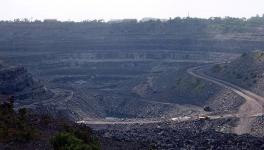Modi Govt Tweaks Green Law to Allow Coal Extraction Sans Final Forest Clearance
Image Courtesy: Down to earth
New Delhi: In yet another attempt to help corporate biggies that have recently forayed into commercial coal mining, the Narendra Modi government has tweaked an environmental law to allow extraction of combustible mineral even before obtaining final forest clearance.
The Forest Advisory Committee (FAC) of the Union Ministry of Environment, Forests & Climate Change (MoEF&CC), in a meeting held in the last week of November, allowed commencement of mining activities in non-forest parts of coal lease areas simply by obtaining Stage I of forest clearance under the Forest (Conservation) Act, 1980.
As per environment laws, mining operations can commence only after obtaining final forest clearance from the government. However, the FAC has now decided that in certain lease areas that comprise both forest and non-forest land, mining activities for coal can commence on the latter even with Stage II clearance pending.
The decision was taken at the behest of the Union Ministry of Coal which had requested the MoEF&CC to allow commencement of mining operations in non-forest areas in projects where Stage-I approval for forest area and environment clearance for the project has been obtained.
“FAC after due deliberation, observed that agreeing to the request as such may create fait accompli situations and cannot be agreed as a general principle. For specific cases in which the forest land/non-forest land is already broken within an area having approved mining plan, permission for commencement of mining operation only in non-forest area may be considered by the State government after Stage I approval,” state the minutes of FAC’s meeting held on November 25.
However, the FAC has laid down certain terms and conditions for commencement of mining following Stage I approval. Mining activities can be permitted only if all compensatory levies stipulated in Stage I approval have been deposited by the project proponent and environment clearances for the entire lease area have been obtained. It has also been stated clearly by the FAC that permitting mining activities in non-forest areas shall not create any obligation of fait accompli with regard to Stage II clearance for the forest area.
“It is good that the FAC has cautioned a fait accompli approach and has not adopted this as a general principle. However, even a case-to-case approach allowing for mining after Stage I approval reads down the precautionary approach that is built into the practice of securing step-wise approvals. Allowing for mining operations without final approval assumes that all Stage II approval conditions, like additional wildlife studies or compliance with Forest Rights Act, will have no bearing on final approvals by both Central and governments. This also undermines the final decision of the state government that has the power to hold back or approve forest land diversion,” said Kanchi Kohli of the Delhi-based Centre for Policy Research.
In accordance with the Forest (Conservation) Act, 1980, a Stage I clearance for carrying out non-forest activities on forest land is provided by the state government concerned. Stage II approval is provided by the Central government following which the application comes back to the state government. Forest diversion comes into effect only when the state government concerned issues an order under Section II of the Forest (Conservation) Act, 1980. Henceforth, non-forest parts of a coal mining lease area will only have to go through Stage I clearance before the ground is broken for extraction.
Experts say it will be difficult to ensure compliance by project proponents, given the poor track record in the country at environment conservation vis-à-vis mining activities, since there exists no robust monitoring mechanism at the ground level. Determination of the exact co-ordinates of forest and non-forest areas are subject to the jurisdiction of the local Divisional Forest Officer only which, it is presumed, will open the ground for corruption as has been witnessed in past cases of illegal mining.
“Not having a monitoring mechanism is not a substitute for holding back forest clearances. Monitoring has to be conducted by the government regardless of the stage of forest clearance. No purpose is solved by holding back forest clearances because this line of action is not in the interest of growth and development,” Partha Sarathi Bhattacharya, former Chairman of Coal India Limited, told NewsClick.
Big corporate houses have successfully bagged 19 of the 38 coal blocks that were put up for auction for commercial coal mining by the Modi government earlier this year. In June, the Central government had listed 41 coal blocks in an auction for commercial coal mining. The list was later scaled down to 38 following protests by the Chhattisgarh government which claimed that some of the coal blocks listed for auction fell within densely forested areas.
The aforesaid change in policy in terms of forest clearances comes on the heels of a series of reforms undertaken by the Modi government in the coal and power sectors throughout this year simultaneously with the opening up of commercial coal mining sector to private players after almost 50 years.
In April 2020, the Union Power Ministry evolved a policy for thermal power plants to switch over their fuel input from imported to domestic coal. In May, the need for thermal power plants to mandatory use coal with ash percentage below 34% was done away with. The government also did away with the need to put coal to a washing process before feeding it into power plants.
In November, the Modi government again initiated a policy measure whereby thermal power plants were allowed to change their sources of coal without necessarily having to change their environmental clearances. These policy measures have been undertaken with great disregard for the environmental impacts thereof even as power plant owners have grappled with issues pertaining to satisfactorily dispose of fly ash (generated as a byproduct from the burning of coal) and to keep emissions in power plants within prescribed norms.
The writer is an independent journalist.
Get the latest reports & analysis with people's perspective on Protests, movements & deep analytical videos, discussions of the current affairs in your Telegram app. Subscribe to NewsClick's Telegram channel & get Real-Time updates on stories, as they get published on our website.























